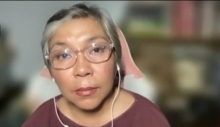The Story of Our Lives: Election Issues for an Informed Citizenry
Second in a series on the Roundtable discussion organized by IAWRT Philippines, OsloMet Journalism and Media International Center, in partnership with the Philippine Press Institute and Hanns Seidel Foundation.
by Margarita Valle
Rappler Head of Regions Inday Espina-Varona discussed the importance of amplifying voices of the marginalized and people’s agenda of change for the upcoming elections and beyond during the roundtable discussion and forum, “Halalan 2022: Ready na ba ang kababaihan sa media?” on October 9.
Women journalists and female journalism/communication teachers and students participated in this online event organized by the International Association of Women in Radio and Television (IAWRT) Philippines and Oslo Metropolitan University (OsloMet) Journalism and Media International Center (JMIC) in partnership with the Philippine Press Institute (PPI) and Hanns Seidel Foundation (HSF).
Varona shared her thoughts on how journalists can make a difference, especially during elections. She said 2022 is “an ‘existential’ election” for several reasons.
For one, the veteran journalist who has persistently and painstakingly tackled social issues in her coverage across different government administrations for decades sees the Duterte government as one that is in “disarray.” Citing the slow drop in approval rating in the national surveys and discontent with key governance areas, Varona pointed out that citizens have become critical of the way Duterte tried to sneak into the vice presidency run machinations.
At the same time, the current political maneuverings of the status quo seem to dominate, particularly on social media, where the army of trolls seems to be determined to pursue spreading disinformation and deceit in whatever manner they see fit. However, she cited the “specter of accountability” faced by the president, even as “the ‘opposition’ is equally unwieldy” and there are “too many challengers” dissipating “odds of stopping Duterte’s favored successor and/or proxies.”
She added that the challenge of ending Duterte’s despotic rule seems gargantuan, citing the threat of COVID-19 that continues to hamper grassroots campaigns. Moreover, legacy and digital media battlegrounds only benefit the rich, as the “promiscuous chase for profits by tech companies worsen the problem of disinformation.”
Seeing that “even the most organized blocs of the opposition lack a strategic view of social media” and “parochial and sectarian mindsets trap messages in silos and prevent amplification,” Varona noted that these add up to the mounting challenges that media is facing. The lack of critical consciousness among the so-called opposition has somehow drowned their dissenting voices, making them invisible in their fight.
Varona then presented some strategies for journalists that would “highlight people’s issues” in the current race for government positions. Citing what surveys have revealed about the current national situation with regard to the lack of jobs, loss of income, poverty, hunger, COVID-19, and corruption, she laid out how the media should cover the elections.
Among these are the following tips:
- Go beyond the usual suspects
- Look for authentic voices
- Frame stories on a human scale
- Show how communities are linked by pain and struggle
- Never forget hope
In addition, she suggested that journalists “be conscious of media consumption patterns.”
She encouraged using “live and video shorts (immersive experience) with dramatic photos” and practicing “data and visual journalism,” which helps explain complex issues.
Further elucidating on these strategies, she said issues that directly affect people’s lives need to be highlighted in the election coverage, as these are the political yardsticks that would measure the real intention of the candidates in running for specific positions in government service.
Varona likewise stressed the need for journalists to not only inform the public but more importantly, help the electorate understand issues. Citing the circus that the electoral processes have become for decades, she said the journalists’ most important role in Philippine society today includes engaging audiences, concretizing stories, and helping people understand the context of stories are crucial.
“Always bring a story down to the everyday experience,” she stressed. “That will mean that you are one. You are not separate, you are not above your audience… you are actually with them.”








